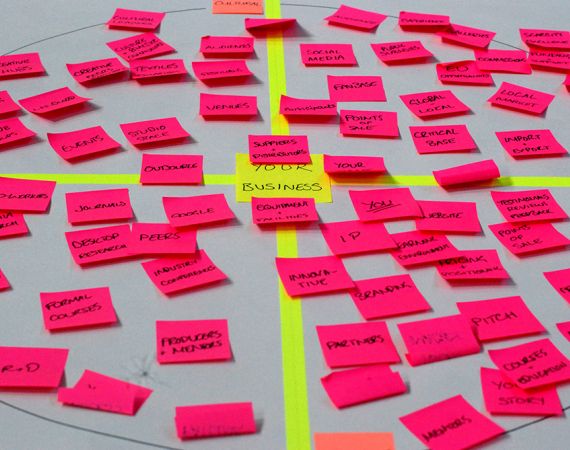Article
Posted on Wed 3 Apr 2019
Business support for creatives in a post-industrial era
Network for Creative Enterprise: a few highlights of achievements, challenges, learning and what next.

Photo: Vanessa Bellaar Spruijt
Posted by

Vanessa Bellaar Spruijt
Vanessa Bellaar Spruijt is currently a producer on the MyWorld programme, a five year programme which will showcase the latest advances in digital production and research.I am the Network Producer for a programme called Network for Creative Enterprise at Watershed in Bristol and presented recently to producers of similar projects and the Department for Culture, Digital, Media and Sport as part of Arts Council England's Creative Local Growth Fund away day. I talked about some of our achievements and learnings and thought it would be good to also share them here (although turning a talk into a blog post is a much harder task than I imagined).
Network for Creative Enterprise is a network working in partnership between the UWE Bristol and four West of England hubs: The Guild co-working space in Bath and three Bristol hubs: Spike Island, KWMC The Factory and Watershed. NfCE is funded by Arts Council England and the European Regional Development Fund.
NfCE finishes at the end of June 2019. To explain a little about how we work: each hub has a producer and offers business support for creative individuals and micro companies to develop their creative idea into an economically sustainable enterprise, they are also offered free space for the duration of the programme.
Our support is shaped in two ways:
1) a pre-planned programme, including business mentoring sessions, law and tax clinics, business development bursaries and producer support.
2) a highly flexible and evolving strand of activity consisting of workshops, intensive courses and bespoke support which is responsive to residents' needs.
Just like most worthwhile experiences in life, the success of this programme has people at the heart of it. As this resident at KWMC The Factory who has recently cut down her salaried days in order to build her own jewellery and exhibition business reflects:
"NfCE has been more to me than access to amazing facilities, information and funding. It has helped me connect with like-minded people and it’s really changed my working life being able to bounce ideas around and get inspired! I’m very proud to be part of a network with such talented and supportive residents and staff alike!”
Network for Creative Enterprise has all sorts of impact, but I think the two key achievements are:
1) Establishing a network of organisations who are all working towards a common talent development programme with the ability to share learning in real time.
Some of the hubs we are working with didn’t have mature residency programmes and the programme has enabled a more robust offering with good sharing and co-working practices thereby strengthening the talent support capacity in the region (which is the West of England). By bringing together expertise from fine art to fabrication and creative technology, we are better equipped to share resources and provide business development opportunities to the growing freelance and micro-enterprise ecology within the cultural and creative sector.
2) Creating a network of peers to support each other that will outlast the project.
We currently have 138 active residents across the hubs and over 900 people participating in wider activity. They are increasingly active in forging peer to peer relationships as our activities invite residents to the different hubs, allowing for more cohesion between the physical locations and the opportunities we each have to offer. Peer support networks are a strong focus area for our final activity on the programme.
Naturally, this complex project has a series of challenges, but I think the two main challenges are:
1) Metrics
Although, reasonably, we are asked to measure impact (in this case in the form of progress against targets) in order to justify our funding, this can be hard in our sector. Most notably, the European Regional Development Fund (ERDF) defines a job as nothing less than a year long, full time contract (or two part-time posts equivalent) which is difficult to reconcile with the broader economic realities in the cultural and creative sector.
34% of the creative industry workforce is made up of freelancers. A snapshot of a part of our community shows that the majority of people are working upwards of 20 hours per week on their own business and are paying themselves a base salary in most cases, but not enough to be recognised as a job by ERDF. A smaller group have PAYE staff but typically for two or three days per week on a six-month contract which, again, does not count. Moreover, during this project most residents, businesses or sole traders, are hiring or have hired temporary freelancers amounting to hundreds of days of work but zero ‘jobs’ by the official definition.
Not being able to count the economic activity of the eco-system is unrepresentative and therefore a risk for the future funding of similar projects. We no longer live in an industrialised world, where linear rapid growth metrics apply. The creative sector with its high proportion of freelancers, so called 'life style businesses', cross sector collaborations and disruptive innovation is a complex mixed bag that deserves the right support at the right time to flourish.
2) Budget Inflexibility
To meet ERDF requirements the budgets for this project were very precisely created at the onset with specific activity and spend allocations. As explained, we structure the majority of our programme to be responsive to the needs and demands of our resident communities and hence some of the ideas we had at the beginning have needed to change to support development of the individual residents.
The inflexibility around budget categories and procurement thresholds means that we are regularly re-inventing the wheel around types of support as well as struggling to find capacity to produce new programmes that we would like to pay for.
We have not successfully overcome these challenges, but we have mostly found a compromise. We have shaped our programme to reach the targets we need, while working hard to protect the ability to create meaningful support. Despite the constraints we are over target on a range of categories, which is great for reporting purposes. In our world many of the residents have accelerated their businesses but it remains frustrating that this is not recognised by ERDF at present.
Clearly it is incredible and important that we have been given funding to create a programme like this and both ACE and ERDF teams have been nothing but brilliant in accommodating our programme needs, and working with a mixture of funders in collaboration is progressive. However, I also think it is important to highlight when some of the mechanisms around the funding criteria themselves do not work as well as they could do - for the sake of all of us working in the creative sector.
What is the most important lesson for us?
We are trying to support a complex ecosystem with diverse economic communities and hugely varying needs. Funding needs to be more flexible and more time needs to be built in to develop formats with participants.
We are working with people who are worried about registering with HMRC for taxes on one end of the scale, and people who need to set up a board because they have expanded their business so much on the other.
There are no linear pathways and hence we need to be as flexible as possible to allow us to offer the right support at the right time. That way we can really help businesses accelerate and grow.
The strength of the cultural sector is its diversity and therefore flexibility is vital.
What next?
On 6 June 2019 we will launch an exhibition ‘Ways of Working’ showcasing the unique maps of a selection of 12 creative business journeys that have taken place with support from Network for Creative Enterprise. This will be a chance to reflect on the programme and interrogate some of the business development stories in depth.
For most of June, the exhibition space at KWMC will become a place to share key learnings and insights from the NfCE programme, in the form of visual display and through a series of live events, including workshops. There will be activity for producers on these types of programmes as well as residents who enrol on these types of programmes. We will also focus on peer networks and signpost to other business support opportunities in the West of England.
The more we actively seek to recognise and celebrate difference, the more chance we have to create long-lasting and meaningful impact, networks and a vibrant creative ecosystem that is recognised for its economic worth as well as everything else.
---
Further reading
You can read previous Network Producer Rachael Burton’s article about the key challenges of creative business sustainability and growth here.
You can read previous Network Producer Rachael Burton’s article from the start of the programme about our approach to business support for creatives here.
